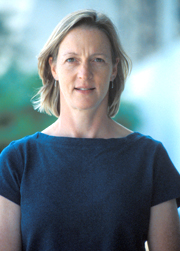Betsy Keller

Betsy A. Keller, PhD, is a professor in the Department of Exercise & Sport Sciences at Ithaca College in New York. She is a fellow of the American College of Sports Medicine (ACSM), past member of the Board of Trustees of ACSM, and past president and former department chair of the Mid-Atlantic Regional Chapter of ACSM.
Since 2005, she has provided 2-day cardiopulmonary exercise testing (CPET) for persons with ME/CFS for purposes of research and/or to provide an objective assessment of functional capacity and ability to perform and recover following physical work for disability reports. She studies the effects of physical activity in ME/CFS on parameters of physiological and immune function.[1]
In 2015 Keller said "Given what we have learned in the past eight years about this illness, it is intellectually embarrassing to suggest that ME is a psychological illness."[2]
In 2017, Dr. Keller became an exercise physiology researcher at the Center for Enervating NeuroImmune Disease, Cornell University, New York, an ME/CFS Collaborative Research Center partially funded by the NIH.[3]
Boards and committees
Institute of Medicine committee
Keller was one of the experts on the "Committee on the Diagnostic Criteria for Myalgic Encephalomyelitis/Chronic Fatigue Syndrome" that was convened for the 2015 Institute of Medicine report.[1]
ME/CFS Common Data Element (CDE) Project
Member of the Post-Exertional Malaise Working Group and Quality of Life/Functional Status (CPET)/Activity Working Group of the Myalgic Encephalomyelitis/Chronic Fatigue Syndrome Common Data Element (CDE) Project sponsored by the National Institute of Neurological Disorders and Stroke and the Centers for Disease Control and Prevention.[4]
Notable studies
- 2014, Inability of myalgic encephalomyelitis/chronic fatigue syndrome patients to reproduce VO₂peak indicates functional impairment[5] (Full Text)
- 2016, A Pair of Identical Twins Discordant for Myalgic Encephalomyelitis/Chronic Fatigue Syndrome Differ in Physiological Parameters and Gut Microbiome Composition[6]
- 2018, Eukaryotes in the gut microbiota in myalgic encephalomyelitis/chronic fatigue syndrome (Full Text)[7]
- 2018, Cardiopulmonary Exercise Test Methodology for Assessing Exertion Intolerance in Myalgic Encephalomyelitis/Chronic Fatigue Syndrome[8] (Abstract)
- 2022, Plasma metabolomics reveals disrupted response and recovery following maximal exercise in Myalgic Encephalomyelitis/Chronic Fatigue Syndrome[9] - (Full text)
Talks and interviews
- 2013, ‘A Foreign and Illogical Result': Dr. Betsy Keller on Exercise Testing in Chronic Fatigue Syndrome (ME/CFS)
- 2016, 12th International IACFS/ME Biennial Clinical and Research Conference, Emerging Science and Clinical Care, How Cardiopulmonary Exercise Testing Informs Pathology and Treatment(Workshop given with Christopher Snell, Ph.D. and Mark VanNess, Ph.D.)
- 3-5 May 2018, ME/CFS Canadian Collaborative Team Conference - Speech titles: What Do We Learn About ME/CFS From a Cardiopulmonary Exercise Test? and Is Heart Rate a Valid Exertional Index in ME/CFS?[10]
Online presence
See also
- Center for Enervating NeuroImmune Disease
- Exercise based on 2-day CPET
- Institute of Medicine
- Post-exertional malaise
Learn more
- Ithaca College - Betsy Keller
- 2012, Exercise Testing and Using a Heart Rate Monitor
- 2014, NEW DIAGNOSTIC TOOLS FOR ME/CFS
- 2018, Tireless Work on Chronic Fatigue Syndrome
References
- ↑ 1.0 1.1 Committee on the Diagnostic Criteria for Myalgic Encephalomyelitis/Chronic Fatigue Syndrome; Board on the Health of Select Populations; Institute of Medicine (February 10, 2015). Biographical Sketches of Committee Members, Consultants, and Staff. US: National Academies Press.
- ↑ Speedy, Dr (January 22, 2015). "THE NICEGUIDELINES BLOG: Exercise physiologist Prof Keller: it is intellectually embarrassing to still suggest that ME is a psychological illness". THE NICEGUIDELINES BLOG. Retrieved October 11, 2019.
- ↑ "Cornell Center for Enervating NeuroImmune Disease". neuroimmune.cornell.edu. Retrieved August 9, 2018.
- ↑ "Complete Myalgic Encephalomyelitis/Chronic Fatigue Syndrome CDE Roster". NIH. Retrieved October 11, 2019.
- ↑ Keller, Betsy A; Pryor, John; Giloteaux, Ludovic (2014). "Inability of myalgic encephalomyelitis/chronic fatigue syndrome patients to reproduce VO2peak indicates functional impairment". Journal of Translational Medicine. 12 (1): 104. doi:10.1186/1479-5876-12-104. ISSN 1479-5876. PMID 24755065.
- ↑ Giloteaux, Ludovic; Hanson, Maureen R.; Keller, Betsy (2016), "A Pair of Identical Twins Discordant for Myalgic Encephalomyelitis/Chronic Fatigue Syndrome Differ in Physiological Parameters and Gut Microbiome Composition", American Journal of Case Reports, 17: 720-729, doi:10.12659/AJCR.900314
- ↑ Mandarano, AH; Giloteaux, L; Keller, BA; Levine, SM; Hanson, MR (2018), "Eukaryotes in the gut microbiota in myalgic encephalomyelitis/chronic fatigue syndrome", PeerJ, 6: e4282, doi:10.7717/peerj.4282
- ↑ Stevens, Staci; Snell, Chris; Stevens, Jared; Keller, Betsy; VanNess, J. Mark (2018). "Cardiopulmonary Exercise Test Methodology for Assessing Exertion Intolerance in Myalgic Encephalomyelitis/Chronic Fatigue Syndrome". Frontiers in Pediatrics. 6. doi:10.3389/fped.2018.00242. ISSN 2296-2360.
- ↑ Germain, Arnaud; Giloteaux, Ludovic; Moore, Geoffrey E.; Levine, Susan M.; Chia, John K.; Keller, Betsy A.; Stevens, Jared; Franconi, Carl J.; Mao, Xiangling; Shungu, Dikoma C.; Grimson, Andrew (March 31, 2022). "Plasma metabolomics reveals disrupted response and recovery following maximal exercise in Myalgic Encephalomyelitis/Chronic Fatigue Syndrome". JCI Insight. doi:10.1172/jci.insight.157621. ISSN 0021-9738.
- ↑ "ME/CFS Canadian Collaborative Team Conference program" (PDF). Retrieved March 6, 2019.

